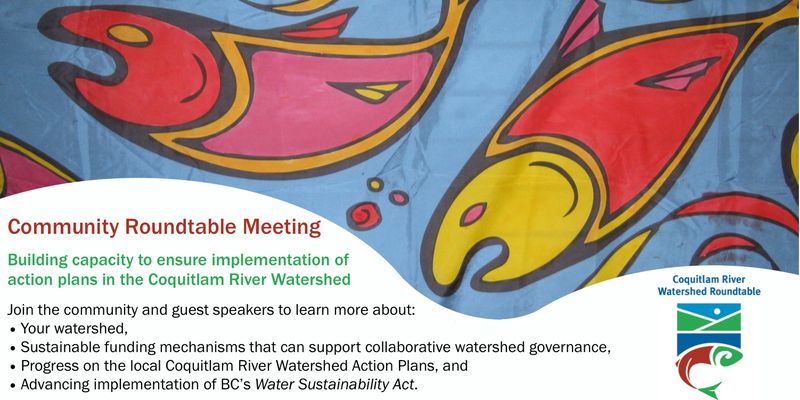COMMUNITY ROUNDTABLE MEETING ON JUNE 10 – an opportunity to explore sustainable funding mechanisms for watershed initiatives in BC
Note to Reader:
The Coquitlam River Watershed Roundtable has made significant advancements under its collaborative model. One highlight is the development of a unique watershed plan. With the development and launch of the Lower Coquitlam River Watershed Plan in 2015, the Roundtable is poised to implement strategies for action in partnership with local municipalities, the regional government, First Nations, and private/public stakeholders to support watershed sustainability.
The Community Roundtable Meeting taking place on June 10 in Port Coquitlam will share multi-sector, public, and expert perspectives on local watershed governance, sustainable funding mechanisms, and collaborative decision-making. The Roundtable’s draft Business Proposal will be shared with the public for the first time.
To Learn More:
Click on DOWNLOAD MEETING AGENDA.

For event details and to RSVP, visit FREE REGISTRATION
A CALL TO ACTION: Governments, First Nations, Private Stakeholders, Watershed Governance and Policy Experts, and Members of the Public Convene to Discuss the Future of the Coquitlam River Watershed Roundtable and Watershed Initiatives in BC (June 10)
Exploring sustainable funding mechanisms for watershed initiatives
 The Roundtable’s draft Business Proposal draws on examples of successful implementation and delivery of sustainable funding mechanisms in other watersheds, notably:
The Roundtable’s draft Business Proposal draws on examples of successful implementation and delivery of sustainable funding mechanisms in other watersheds, notably:
- Drinking Water & Watershed Protection (DWWP) program in the Regional District of Nanaimo (RDN)
- Shuswap Watershed Council in the Columbia Shuswap Regional District (CSRD)
- Shawnigan Basin Society in the Cowichan Valley Regional District (CVRD)
“The Community Roundtable meeting will be an opportunity to hear from experts on successes and challenges in regions across BC. What works here will not be the same as what works in another watershed,” states Melissa Dick, Coordinator of the Coquitlam River Watershed Roundtable.
A Reliable Source of Funding:
 “In the Nanaimo region, our parcel tax function provides us with a reliable long-term funding source to enable our work related to water sustainability education and outreach, data-collection and monitoring, and planning/policy development for our region,” states Julie Pisani, Coordinator of the DWWP at the Regional District of Nanaimo.
“In the Nanaimo region, our parcel tax function provides us with a reliable long-term funding source to enable our work related to water sustainability education and outreach, data-collection and monitoring, and planning/policy development for our region,” states Julie Pisani, Coordinator of the DWWP at the Regional District of Nanaimo.
“This in turn magnetizes other partners and resources, to collaborate on watershed initiatives with us, as we are recognized as an equipped, dependable and long-term player.”
Diverse Sources of Funding:
 “Diversity is key in sustainable financial planning, and we have already seen examples of what is possible when there is a strong partnership between, for example, a city and a watershed group. It is important to consider a blend of funding mechanisms. Resilience comes from diversity,” stresses Zita Botelho, Project Manager for the Sustainable Funding for Watershed Governance Initiatives.
“Diversity is key in sustainable financial planning, and we have already seen examples of what is possible when there is a strong partnership between, for example, a city and a watershed group. It is important to consider a blend of funding mechanisms. Resilience comes from diversity,” stresses Zita Botelho, Project Manager for the Sustainable Funding for Watershed Governance Initiatives.Implementing elements of the Lower Coquitlam River Watershed Plan, opportunities and challenges
“The collaborative, knowledge-sharing, and inclusive approach of the Roundtable has been central to its past successes and will continue to be a key characteristic as it works to implement elements of the Watershed Plan in alignment with efforts by the local municipalities and regional government,” notes Melissa Dick.
 “One way to enhance the capacity of local governments to assess impacts is to work collaboratively – with other local governments, provincial and federal governments, government agencies, First Nations, the academic community and professional associations – many of which are already working to understand how the climate and ecosystems are changing and what the impacts will be. A number of these groups are already working with various local governments in BC,” states Deborah Carlson, Staff Counsel with West Coast Environmental Law.
“One way to enhance the capacity of local governments to assess impacts is to work collaboratively – with other local governments, provincial and federal governments, government agencies, First Nations, the academic community and professional associations – many of which are already working to understand how the climate and ecosystems are changing and what the impacts will be. A number of these groups are already working with various local governments in BC,” states Deborah Carlson, Staff Counsel with West Coast Environmental Law.
What does the new Water Sustainability Act (WSA) mean for local watershed governance?
“With provisions including the potential for innovative water sustainability plans, a new ability to formally delegate decision-making under the Act, and enhanced protections for environmental flows, the WSA—if fully implemented through a partnership approach—can provide a robust framework for freshwater management and governance in the province,” says Rosie Simms, Water Law and Policy Researcher/Coordinator with the POLIS Water Sustainability Project.
“Provisions for local control are incredibly important. Local communities know and care about their watersheds, and they are the ones who have the know-how and drive to protect them,” adds Coree Tull, Organizing Director, Canadian Freshwater Alliance.




